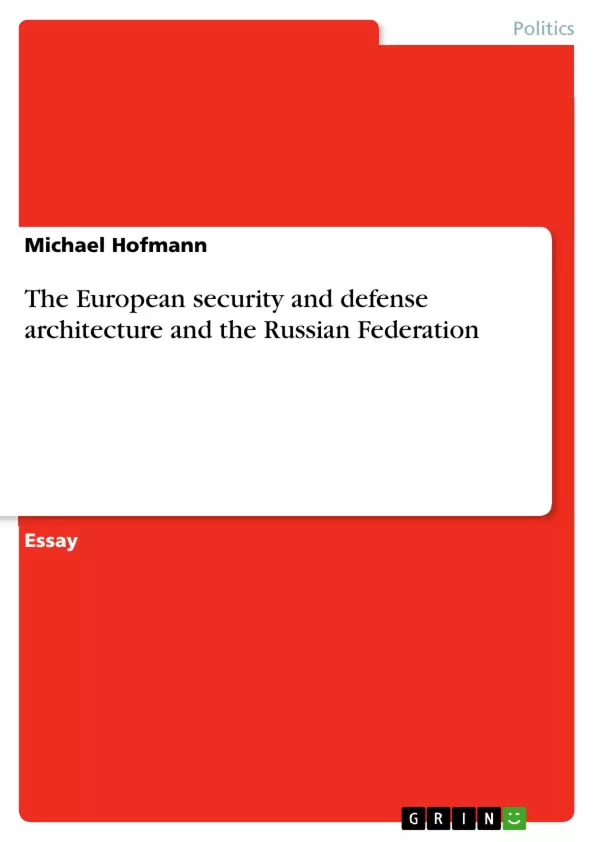During his speech at the Security Conference in Munich in February this year, the Russian Defence Minister Ivanov emphasised that there is ‘plenty of work to be done’ concerning the relations between Russia and the European Union (EU) in the fields of security and defence policy. Further, he urged for the deepening of the dialogue between Russia and the North Atlantic Treaty Organization (NATO). A successful Europe, according to Ivanov, cannot be built without a close partnership between Russia and the European security institution.
Ivanov’s speech constitutes an adequate example for efforts of the Russian Federation aimed at getting more involved into European security issues. By examining the completed NATO and EU enlargements in 1999 and 2004, the ambition of Russia to have an influential say in European security questions becomes obvious. Being confronted with enlargement processes that incorporated a former Soviet sphere of influence, the Russian Federation regards itself as being excluded. Both sides, EU/NATO and Russia currently do not consider full Russian accession to these organisations as a possible and desirable policy option in the short- and medium-term.
Therefore, European security institutions are facing the problem of finding a way to cooperate with those states that do not wish or are not allowed to join these institutions. How to fit in the Russian Federation, can thus be regarded as one of the most urgent issues in European security policies.
This essay will argue that the underpinnings of the security cooperation are actually very fragile and are lacking substance. In particular, the lack of a shared set of common aims, interests, and values make it difficult to develop a sustainable security partnership between Europe’s security institutions and Russia.
Inhaltsverzeichnis (Table of Contents)
- Introduction
- Post-Cold War Developments and the Marginalisation of Russia
- Security Cooperation: The Current State of Relations
- NATO-Russia Relations
- NATO-Russia Relations: The Institutional Framework
- NATO-Russia Relations: An Assessment
- EU-Russia Relations
- EU-Russia Relations: The Institutional Framework
- EU-Russia Relations: An Assessment
- OSCE-Russia Relations
- NATO-Russia Relations
- The End of the NATO-Russia Honeymoon?
- NATO Enlargement and a More Political Role for NATO
- The Limited Extent of the Current Cooperation
Zielsetzung und Themenschwerpunkte (Objectives and Key Themes)
This essay aims to analyse the fragile and lacking substance underpinnings of security cooperation between European security institutions and Russia. It argues that the lack of a shared set of common aims, interests, and values makes it difficult to develop a sustainable security partnership.
- The marginalisation of Russia in European security policy following NATO enlargement
- The current state of security cooperation between Russia and NATO, EU, and OSCE
- The challenges and obstacles to deeper security cooperation between Russia and the West
- The potential impact of NATO's re-definition of its role on Russia-West relations
- The limitations of existing cooperation frameworks, particularly in light of Russia's domestic developments
Zusammenfassung der Kapitel (Chapter Summaries)
Chapter II analyses the post-Cold War developments in the relationship between Western security institutions and Russia, highlighting the factors that led to Russia’s marginalisation. It outlines the patterns and reasons for Russia’s exclusion from the Euro-Atlantic security community.
Chapter III examines the current state of security cooperation between Russia and NATO and the EU. It explores the different institutional frameworks for cooperation and assesses their effectiveness in addressing shared security concerns, particularly in the area of counter-terrorism.
Chapter IV discusses the potential challenges to NATO-Russia relations in the future. It explores the implications of NATO's evolving role and the limited extent of current cooperation, suggesting that a more political NATO could further exacerbate tensions with Russia.
Schlüsselwörter (Keywords)
This essay focuses on European security policy, NATO-Russia relations, EU-Russia relations, OSCE-Russia relations, security cooperation, marginalisation, shared values, common interests, counter-terrorism, NATO enlargement, and the future of security architecture in Europe.
Frequently Asked Questions
What is the current state of security relations between Russia and the EU/NATO?
The relations are described as fragile and lacking substance, primarily due to a lack of shared common aims, interests, and values between the Russian Federation and European security institutions.
Why does Russia feel marginalized in European security issues?
Following the NATO enlargements in 1999 and 2004, which incorporated former Soviet spheres of influence, Russia regards itself as being excluded from the Euro-Atlantic security community.
Is full Russian accession to NATO or the EU a possibility?
Currently, neither side considers full Russian membership in these organizations as a desirable or possible policy option in the short- or medium-term.
What are the main institutional frameworks for cooperation?
Cooperation is attempted through various frameworks, including the NATO-Russia Council, EU-Russia relations, and the OSCE (Organization for Security and Co-operation in Europe).
What prevents a sustainable security partnership?
The primary obstacles are the lack of shared values and the challenges posed by Russia's domestic developments, which make it difficult to align on long-term security goals.
- Arbeit zitieren
- Michael Hofmann (Autor:in), 2006, The European security and defense architecture and the Russian Federation, München, GRIN Verlag, https://www.grin.com/document/75612



